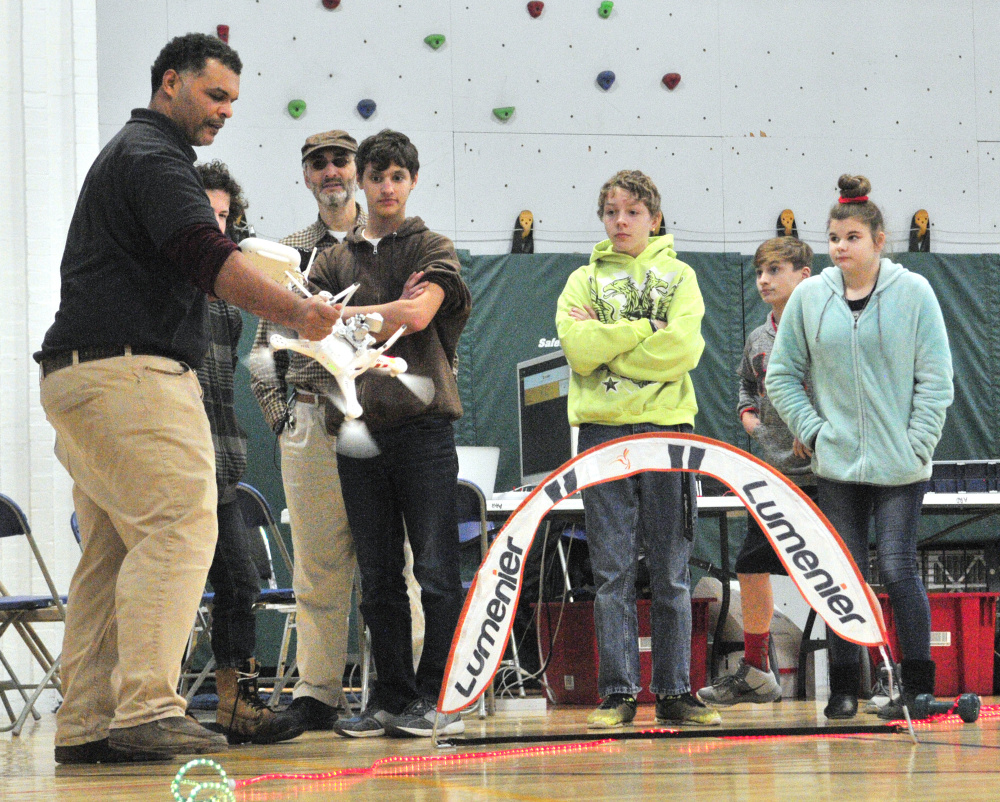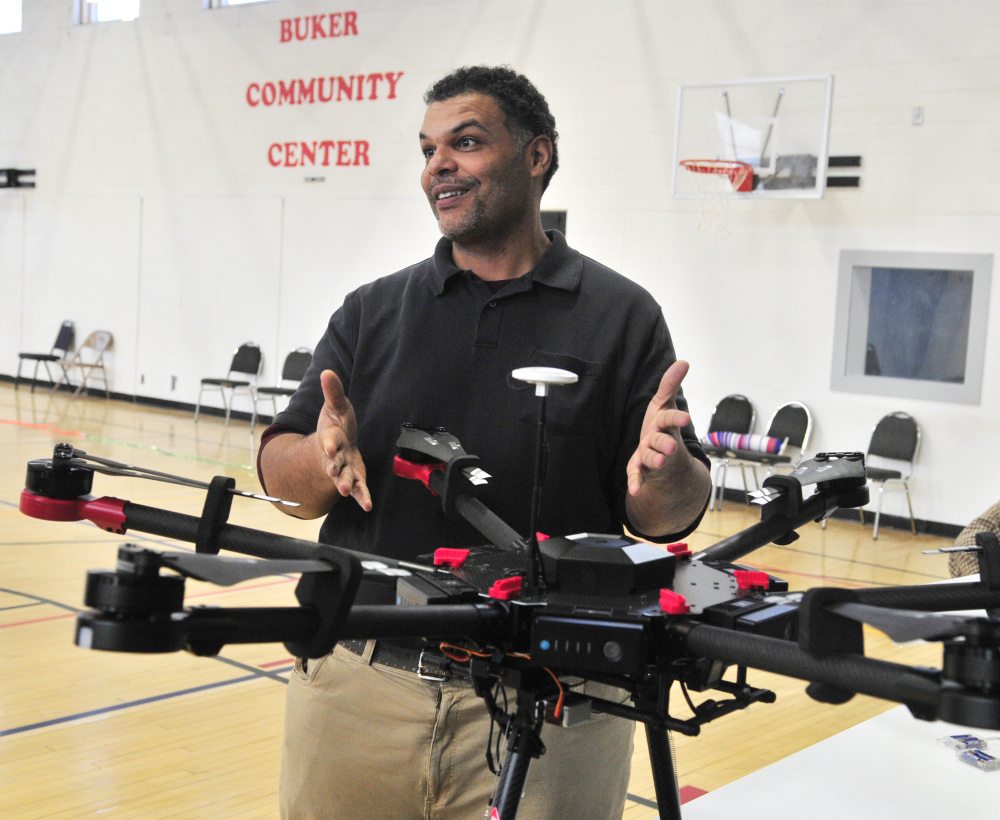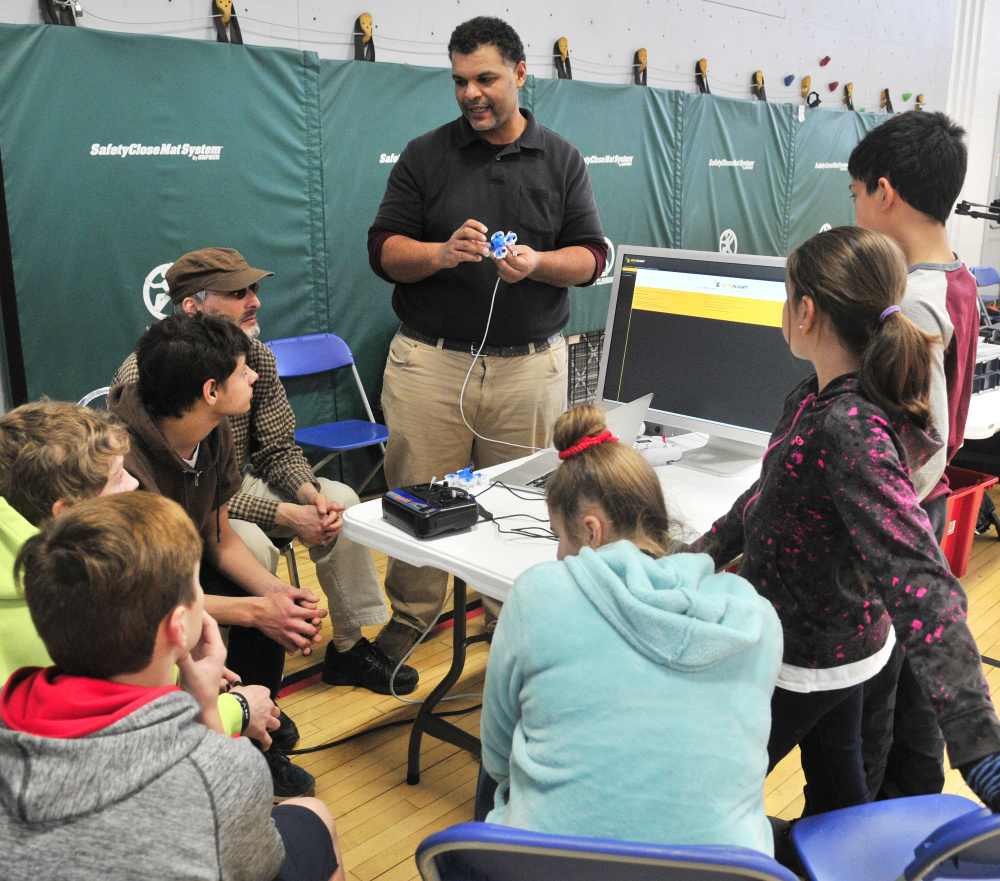AUGUSTA — What was supposed to be a simple demonstration on how to fly an unmanned aerial vehicle quickly turned into an impromptu lesson on drone safety Friday afternoon after one of the aircraft twice “attacked” its operator with the ferocity of a wild animal.
Kristopher Kleva of the Maine Drones Society was bleeding from his right arm and one of his fingers after the incident at the Augusta Boys and Girls Club. He was trying to show a group of teenagers how to operate a DJI Phantom drone, which has a GPS chip and is operated using a remote controller and a smart device app.
Because of the Buker Center’s proximity to the Augusta State Airport, the drone’s rotors wouldn’t begin to spin until it was outside of a certain range. When the drone was in the middle of the gym floor, it was stationary, but once Kleva moved back toward the front of the Buker Center, the drone was active.
It lifted off the ground hovered for a few seconds before it went straight at Kleva, who had to pull out its battery to get its blades to stop spinning. He wrapped his arm in gauze while the group of teens stood around watching in amazement — some were speechless and others were mentioning how they’ve never seen anything like that before. Kleva tried to get the drone to fly a second time, but it did the same thing, and he took a bit of a hit to one of his fingers. He decided to move onto smaller, safety drones for the remainder of the demonstration.
The “Mentoring for an Impact” two-day event sponsored by the Augusta Elks Lodge gave teens at the Augusta Boys and Girls Club the chance to learn how to fly real drones, use a flight simulator and watch members of the Maine Drones Society demonstrate what makes unmanned aerial vehicles fly.
“It’s really cool and a lot of fun,” seventh-grader Kamealiya Eaton said. It was her first experience with a drone, and she had a smile on her face watching her sister, Emilliana Lopez, try to maneuver the small drone around the Buker Center gymnasium.
Lopez, Eaton and Alex Choate took turns flying the drone, which is no bigger than the average fist, around the gym trying to exercise throttle control. The idea, Kleva said, was to keep the drone at a consistent altitude, or height, while flying around the gym from side to side.
Choate was the first one to try, and after a couple of attempts that resulted in the drone crashing to the gym floor, he was able to move the aircraft from side-to-side just an inch or two off the ground for more than a minute. Kleva said it takes a few tries for people to get used to the controls and the movement.
“Turning was the hardest part,” Choate said.
Kleva and Drones Society member Jon Silverman started the demonstration by showing the group a drone flight simulator and a flight programming software program. They wanted the teens to have the opportunity to see a drone fly in angle mode, which keeps the aircraft in the max tilt angle allowed using the control stick, and horizon mode, which allows an operator to do rolls and turns and then returns the aircraft to a level position.
“Most teenagers are interested in the aspect of building something or making something themselves,” Kleva said. “They’re into building and maintaining or they’re really into racing.”
Using $40,000 in grant funding received over the last five years from the Elks National Foundation, the Augusta Elks group has mentored and educated teens at the Boys and Girls Club in volunteerism, dedication and support for one another.
Since the program began, mentors have participated with teens in woodworking, bowling, crafting, gardening and cooking. There have been field trips to Salem, Massachusetts, Monhegan Island, Canobie Lake Park in New Hampshire and Boston for a Red Sox game. Teens have volunteered at Elks events including the homeless veterans stand down at the VA Maine Healthcare System-Togus campus.
Monique LaFlamme said youth programs in central Maine have suffered substantial financial cuts over the last few years, and the Augusta Boys and Girls Club continues to operate with a very limited budget. She said the Elks is always looking for members and businesses who want to help give back to the community. A demonstration from the Maine Drones Society is a way to expose teenagers from central Maine to something they might not otherwise get to see.
“These kids are challenged with money and food, so they don’t get to do this very often,” LaFlamme said. “They were so excited about this.”
Charles Huerth, the club’s director, said the teens were intrigued to see how much someone can do with a drone. He said none of them realized the different uses for drones, and they were interested in learning more about it as the days progressed Thursday and Friday.
“It’s a great way to plant a seed with the kids and get them thinking about the future,” Huerth said.
Jason Pafundi — 621-5663
Twitter: @jasonpafundiKJ
Send questions/comments to the editors.





